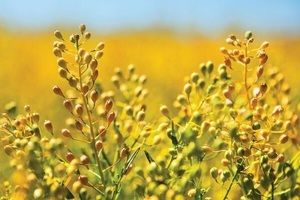Louis Dreyfus and Global Clean Energy renew agreement to expand camelina cultivation in South America

SOURCE: Global Clean Energy Holdings Inc.
March 14, 2025
BY Louis Dreyfus Co.
Louis Dreyfus Company and Global Clean Energy Holdings Inc. announced on March 11 the renewal for an additional 10 years of their collaboration to promote the cultivation of Camelina sativa (camelina) in South America as an intermediate crop, following the successful completion of a two-year pilot program.
Under the renewed agreement, and through its Sustainable Oils and Camelina Company subsidiaries, GCE will continue to develop camelina varieties and produce planting seed while providing technical support to farmers. LDC will oversee origination, establish contracts with local producers and manage the crop harvest processing into value-added products, including high-protein animal feed and sustainable oil for advanced biofuels.
Advertisement
Since its launch in Argentina in 2023, this camelina program has expanded from 5,000 to 25,000 hectares, planning to reach 75,000 hectares in 2025. The program expanded to Uruguay in 2024, reaching 4,700 hectares in the country, with plans to triple that figure in 2025. Camelina Company’s varieties will also soon be introduced to Paraguay, starting in 2025.
“We are thrilled to renew our partnership with LDC for another decade, building on the success of our pilot program, in a context of significant global demand growth for camelina products,” said Noah Verleun, GCE’s president & CEO. “Camelina’s high protein content and sustainability attributes as a regenerative intermediate crop, make camelina meal an increasingly sought-after ingredient for animal feed. Camelina oil also holds tremendous potential as a low-carbon feedstock for advanced biofuels, including Sustainable Aviation Fuel, addressing the growing global renewable fuels market.”
"We are proud of the excellent performance of camelina in the areas where it was planted so far, thriving without displacing any other crops. It has earned high praise from farmers, who have found camelina to be a valuable ‘ally’, not only as an intermediate cover crop generating additional income, but also due to its intrinsic benefits, such as its short growing cycle, tolerance to cold, low water consumption and contribution to soil health," said Pablo Autilio, LDC’s regional head of seeds for South & West Latin America.
Advertisement
As part of the Group’s long-term commitment to promote and support the adoption of sustainable agricultural practices, LDC is also carrying out a significant investment in new equipment to process high-oil-content seeds such as camelina, canola and sunflower at its Timbúes agroindustrial complex in Santa Fe Province, Argentina, scheduled to begin processing these soft commodities in 2026.
“By expanding our processing capacity and enhancing our operational efficiency, LDC is better equipped to meet growing demand for products that contribute to the transition to a low-carbon economy - from high-protein animal feed to advanced biofuels. Our investment in Timbúes, coupled with the renewed agreement with GCE, reflects our commitment to support more sustainable agriculture, food and energy production,” said Fernando Correa, LDC’s regional head of oilseeds for South & West Latin America.
Related Stories
The USDA significantly increased its estimate for 2025-’26 soybean oil use in biofuel production in its latest World Agricultural Supply and Demand Estimates report, released July 11. The outlook for soybean production was revised down.
The U.S. Energy Information Administration maintained its forecast for 2025 and 2026 biodiesel, renewable diesel and sustainable aviation fuel (SAF) production in its latest Short-Term Energy Outlook, released July 8.
XCF Global Inc. on July 10 shared its strategic plan to invest close to $1 billion in developing a network of SAF production facilities, expanding its U.S. footprint, and advancing its international growth strategy.
U.S. fuel ethanol capacity fell slightly in April, while biodiesel and renewable diesel capacity held steady, according to data released by the U.S. EIA on June 30. Feedstock consumption was down when compared to the previous month.
XCF Global Inc. on July 8 provided a production update on its flagship New Rise Reno facility, underscoring that the plant has successfully produced SAF, renewable diesel, and renewable naphtha during its initial ramp-up.
Upcoming Events










